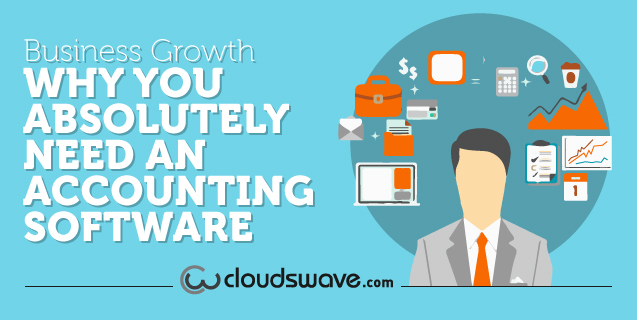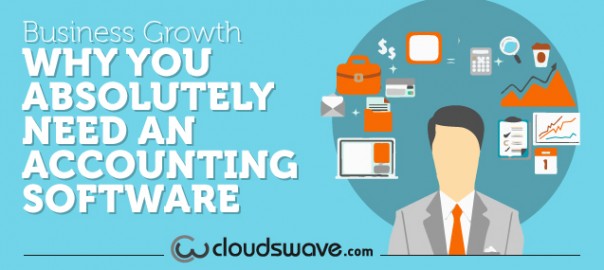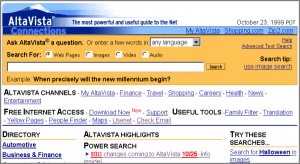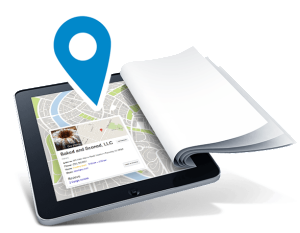
If your financial manager spends a good part of a week updating employee tax code information, working on paychecks, and aggregating financial data from various sources, electronic or otherwise, it’s time to seriously consider getting her a new assistant – in the form of an accounting software.
Unbelievable as it may sound, human errors normally are found in tasks that are routine, and employing the help of a financial tool to automate and streamline the accounting and business management process is good for your company’s bottom line.
Accounting software – the benefits

Investopedia.com defines accounting software as a computer program that assists “bookkeepers and accountants in recording and reporting on a firm’s financial transactions.” Depending on the needs and size of your organization, an accounting software can either be customized or used right out of the box.
Let’s dig into some of the advantages of using such a tool:
1. Accuracy
When creating financial reports, accuracy is the name of the game. Parties interested in a business, like investors or creditors, rely on transparent and accurate financial reporting to make an assessment of its status and performance. Inaccurate financial statements are worthless and can even harm the company’s reputation and trustworthiness.
Using a single database for all financial-related entries and transactions ensures your financial team works on the most up-to-date and accurate information to generate reports reflecting the company’s true financial health. Garbage in, garbage out, remember?
2. Automation
If you’re still doing your accounting the “old school” way, chances are the data you use are on a number of different applications, such as Excel spreadsheets, Word documents, even PowerPoint presentations. You may also have post-it notes next to your computer screen, numbers scribbled on several sheets of paper waiting to be encoded, and so on. And then, there are others who may be working on the same data as you are.
When asked if the business is making any profits, it may take your team a day or two, even up to several weeks to aggregate and make sense of everything, and ultimately formulate a precise evaluation.
With an accounting software, however, accurate financial reports that involve visual implements like bar or pie charts can be created with just a few mouse clicks, literally saving the company a considerable number of man-hours.
3. Up-to-date information
One disadvantage of not having a centralized system is manually editing several files – e.g., one for the Human Resources Management department, another for Payroll, and yet another for Accounting – to update the profile of an employee who’s recently been married, for example. Aside from the time and effort expended to repeatedly input the same information, the possibility of human error can get in the way.
If Payroll fails to update its file for some reason or another, the said employee will likely be calling a payroll clerk’s attention for tax code and deduction adjustments.
4. Time efficiency/speed
Going back to the payroll example above, if one master file is in use, there wouldn’t be any need for adjustments on the payroll staff’s part. As well, since most accounting software either carry a built-in time-tracking system or can be integrated with third-party time-tracking tools, calculating an hourly employee’s wage becomes relatively easy.
5. Organization
With manual systems, several files have to be maintained to ensure data is always accurate and up-to-date, which usually involves several people doing similar tasks. With accounting software solutions, everything is in one repository, can be accessed with ease, and used and updated by any authorized user.
6. Staff productivity/enhanced collaboration
Because there’s no need to look through various places, files, and folders when certain data or information need to be located, a substantial amount of time is saved, allowing employees more time to work on other things.
Also, as most accounting software have enhanced collaborative features, your financial team can work together to speed up task completion.
7. Cost savings
If your finance team no longer contends with inaccurate reports or erroneous forecasts based on inaccurate entries, overtime hours may no longer be warranted to get things done on time. Time saved equals cost saved.
Features to look for in an accounting software system

- Reporting and analytics. An accounting software that comes with built-in standard reports (e.g., profit and loss, balance sheet, and income and expense) that can also be customized can save you tons of time.
- Easy-to-use interface. Choose an accounting tool with user-friendly navigation to ensure successful software adoption in an organization. A system with a complex interface will alienate employees, especially those who aren’t tech-savvy.
- Your accounting software of choice should be easily customizable to suit your unique business needs.
- Anytime, anywhere access. If your finance team is composed of remote and highly mobile employees, a cloud-based solution is recommended.
- Inter-operability. To eliminate redundant data entries and ensure seamless information flow between applications, integration or inter-operability with third-party applications is another feature worth considering.
- Choose an accounting software solution that can grow with you. One that charges on a per-user basis, with options to pay extra for additional features and bandwidth, is a good pick.
Accounting software – some examples

Here are some examples of cloud-based accounting software to consider:
- Xero. A full accounting solution that includes features such as general ledgers, accounting charts, and aged accounts receivable reports, Xero supports unlimited users, regardless of subscription type. Support is free, 24/7, and the tool can be integrated with over 350 third-party applications.
Learn more about Xero here
- FreshBooks. Specifically created for the non-accountant, FreshBooks offers a straightforward and simple way to manage small business finances. Features supported include multi-currency invoicing, online payments, automatic importing of expenses, time tracking, and business reports such as profit and loss statements, payments collected, and expense reports.
Learn more about FreshBooks here
- Bill.com. Bill.com works with other financial software like QuickBooks, QuickBooks Online, Xero, NetSuite, and Intacct, so businesses approve and pay bills faster, invoice and get paid faster, and eliminate much of the paperwork while saving time and money.
Learn more about Bill.com here
- ZenCash. ZenCash is a cloud-based service that helps small businesses manage their collections and receivables. While not a collection agency, the application provides users with a virtual accounts receivables management team responsible for tracking and following up on invoices until they’re finally settled.
Learn more about ZenCash here
- Zoho Books. An accounting application for small and growing businesses, Zoho Books provides users with the ability to send out invoices, accept online payments, track expenses, connect with the company’s bank accounts for real-time cash flow updates, and create powerful reports.
Learn more about Zoho Books
- Sage 50 Accounting. Formerly known as Simply Accounting, Sage 50 Accounting is a business management and accounting software that includes invoicing, bill payments, inventory management, payroll processing, and credit card payments processing.
Learn more about Sage 50 Accounting here
- QuickBooks. A software popular among users with no accounting background, QuickBooks is a multi-featured small business accounting solution that supports invoicing, real-time cash flow monitoring, automatic VAT management, on-the-fly business reporting, and others.
Learn more about QuickBooks here
To view more of the best accounting software in the market today, visit Cloudswave’s vast collection of web-based applications.
How about you? What’s your favorite accounting tool?
(322)
Report Post



